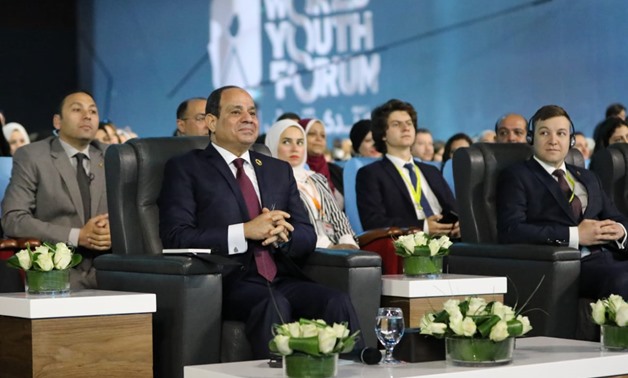
President Abdel Fatah al-Sisi at the World Youth Forum (WYF)- Press Photo
CAIRO - 17 December 2019: In a Tuesday Q&A session with President Abdel Fatah al-Sisi at the World Youth Forum (WYF), he emphasized that the idea of secession will not do justice to the separatist group.
In an answer to a Kurdish participant at the WYF, the Egyptian president reassured her that the Kurdish culture and language have not been and will not be eliminated despite decades of attempts made to do that; nevertheless, and despite the pain of the Kurdish people, establishing a Kurdish state will not help them, he said.
Sisi lamented that some 80 years, much resources and many souls have been spent to put an end to the Kurdish identity instead of dedicating the effort to building, education and development in general. He said that the Kurdish people will reach out to the world and "bridges will be built" peacefully despite of the governments countering that, but also acknowledging that calls for independence within one state is against national security no matter what the grievances behind those calls are.
The president said that, looking at recent experiences, such new states are fragile and unsustainable. He did not name a "failed state" after separation, but referred to Yugoslavia as a successful one, especially at the time it was ruled by Josip Broz Tito. He mentioned it as one strong state where different ethnicities lived together in peace. Yugoslavia no longer exists, as it has split into several countries since the early 1990s.
He reiterated that no project can live off infighting, but rather on development and stability, reminding the Kurdish participant that the lifespan of a person is too short compared to the lifespan of civilizations.
Answering another Czech participant who lives in Iraq, Sisi told the mainly young audience that the Middle-Eastern country was once looked up to in terms of economy and knowledge in the context of the Arab world in the 1970s and 1980s, and that the younger generation should know that about the Iraq they see today.
The "big mistake" of late Iraqi President Saddam Hussein of invading Kuwait in the early 1990s had major ramifications that still could have been undone up until 2003. The U.S. intervention in the country led to dismantling the state, with the security institutions at the forefront, Sisi said.
The coexistence in Iraq was there, albeit unsatisfactory, but reconstruction requires billions of dollars, especially when all Iraqi resources have been allocated to fight off ISIS, Sisi added.
He said that a similar plot was financed and planned in Egypt, but it failed largely due to "divine subtle kindness."

Comments
Leave a Comment